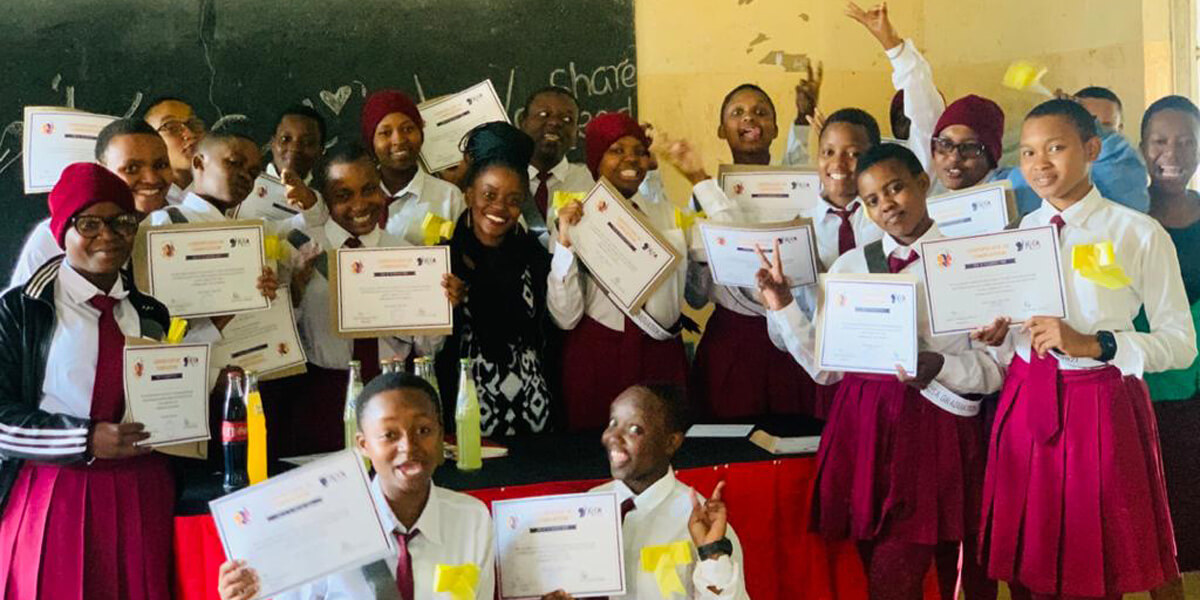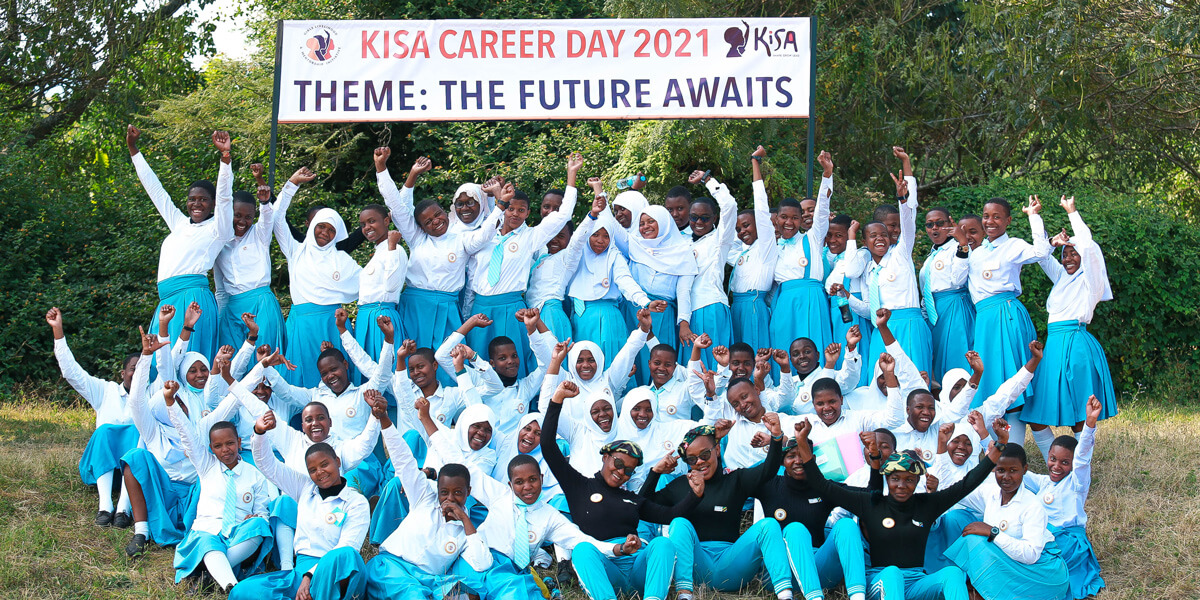When she was 11 years old, Ashley Shuyler Carter ’03 went on a family trip to Tanzania. While she was there, she kept thinking about Colorado Academy—and how many kids in the African nation didn’t have access to anything like it.
“I was taken with the beauty of the country, the people, and the wildlife, but at the same time, I couldn’t reconcile the fact that I had such incredible educational opportunities at CA and that many kids I saw and met on that trip didn’t have the chance to go to school,” says Shuyler Carter, who attended CA from Fourth through Twelfth Grade.
Many of the Tanzanian kids her age she met were working to make a living for their families instead of going to school. Shuyler Carter returned home determined to find a way to make education possible for kids her age there.
Skip to the final scene: She did it. She founded AfricAid, an organization that is celebrating 20 years of helping secondary school girls in Tanzania complete their education.
But there’s a lot more to the story, and the people in it.

A kid with a dream of changing the world
When she got back from the perspective-altering trip, Shuyler Carter got to work. By 2001, she had founded AfricAid and established it as an official 501c3 nonprofit organization. Shuyler Carter was just 16.
It didn’t strike her as odd that she had achieved 501c3 status when she was barely old enough to get a driver’s license—because she went to a school where everyone believed in the power of young people to make positive change in the world.
“It didn’t feel strange, because CA so cultivates that mentality,” she says. “I felt so much confidence, warmth, and support from the teachers and coaches at CA. They went out of their way to encourage me on this path and make me feel like it was possible.”
To complement the organization’s work, she started an AfricAid club at CA. She recruited classmates and her CA Volleyball teammates as members, among them public health leader Elena Harman ’05.
“I looked up to Ashley, so I jumped on board,” says Harman, who was a CA student from Grades 9 to 12.
Club members worked to raise enough money to send 10 girls in Tanzania to four years of secondary school. They organized silent auctions and other fundraising events on and off campus, including one at the Denver Art Museum, where many CA community members showed up to show their support. Club faculty sponsors like Scott Schneider and Dani Meyers supported the students and encouraged their ideas.
“It was a lot of fun to do something so student-led, getting to work with classmates on a project with real impact,” Shuyler Carter said. “We had good and not-so-good ideas along the way. We learned as we went.”
Harman agrees.
“We learned that, as a team, we could achieve more than only sports-related goals,” she says. “We could take our teammate relationships and flex them to help other communities and contribute to the larger world.”

From school club to world thought leader
Despite its early success, Shuyler Carter didn’t think then that the organization would still be thriving two decades later—”never in a million years could I have imagined that in those early days.”
Harman couldn’t have imagined it either, but she’s not surprised.
“Ashley is an impressive woman—we knew that then, and you can see that today,” she says of her old volleyball teammate, who went to Harvard University and got an MBA from Stanford University.
The admiration and respect are mutual and endured through the years after they both graduated from CA. So, in 2020 when AfricAid was looking for a board member to help create an evaluation and monitoring strategy, Shuyler Carter immediately thought of Harman.
“Her name was coming up all the time as the person to know in monitoring and evaluation in Denver,” she says of Harman, who wrote the 2019 book The Great Nonprofit Evaluation Reboot: A New Approach Every Staff Member Can Understand. “Elena and I had stayed in touch, and I couldn’t have been more impressed with where she had taken her career, the depth of her work, and how she’d started her own company.”
Shuyler Carter reached out to Harman, and fortunately, the timing was right. Harman had just sold her consulting company, Vantage Evaluation, and was looking for ways to stay engaged with evaluation.
“The board couldn’t have been more thrilled,” says Shuyler Carter, who led AfricAid for 10 years and has been a board member since 2003. “It’s a gift to have her as part of our team.”
Harman, who has worked with “a ton” of nonprofit organizations over the years, says AfricAid impresses her in more ways than one.
“The organization has undergone many evolutions in response to changing needs, but its mission has always been the same,” she says. “That’s unusual for nonprofits, and it shows a willingness to do the right thing for the community we’re serving.”
Harman also admires AfricAid’s community-led programming. While the organization was born in the United States, it has developed strong partnerships with leaders in Tanzania. These days, the Tanzanian staff makes the decisions about program delivery, and the United States staff fundraises and supports their work.
“We want to equip the local staff with the governance, authority, and resources to bring their vision to life,” Shuyler Carter says, “We very much believe that our partners in Tanzania know what’s right and what’s needed in their communities. We’ve built a real strength in amplifying the work that local leaders do, and we’ve seen really powerful results in terms of academic and health outcomes.”
Now, with Harman helping them use evaluation and data to test their programs’ effectiveness, AfricAid is exploring a thought leadership strategy to share its successful methodology with other organizations around the world.
And from idea conception to fledgling nonprofit to global impact, CA has contributed to that success.
“How grateful I am to CA for embracing this work and for the longevity of its support of AfricAid,” Shuyler Carter says. “Over two decades, we’ve gone on this journey together, remaining connected through this common vision of education opportunities for girls on the other side of the world.”

The gift of an incredible education
What empowers a young person like Shuyler Carter to take a risk to try to make the world a better place? The strong and supportive foundation of a school like CA.
“The teachers and coaches were so invested in helping students flourish,” Shuyler Carter says. “I’m so grateful for how much they encouraged each student to follow their own path, whatever that might be.”
Harman agrees that CA allowed her to explore and find what she loved to do, a process that led her to math, science, and, ultimately, MIT. She credits CA for helping her recognize the education access problem that AfricAid now tackles.
“One thing that really sets CA apart, I think, is the lesson it instills to not take education for granted and rest and coast on that knowledge,” she says. “There was the expectation that when you’re given the gift of an incredible education, you use that to help the broader community around you.”
And sometimes, as in Shuyler Carter’s case, that broader community becomes the world.
“CA instilled in me a real curiosity about the world and my role in it,” Shuyler Carter says. “It made me hungry for understanding and learning, and that’s a big part of what drove me to get to know these girls in Tanzania, what was different and similar about our lives.”
So, that’s the story—of how one curious kid was empowered to follow her calling, how more kids got inspired to help, and how those same kids are grown-ups now and still working together to make the world a better place.
